- Home
- Thornton Wilder
The Bridge of San Luis Rey Page 10
The Bridge of San Luis Rey Read online
Page 10
Camila lurked about the convent church and fell humbly [113] in love with the homely old face, though it frightened her a little. At last she called upon her.
“Mother,” she said, “I … I …”
“Do I know you, my daughter?”
“I was the actress, I was the Perichole.”
“Oh, yes. Oh, I have wished to know you for a long while, but they told me you did not wish to be seen. You too, I know, lost in the fall of the bridge of San. …”
Camila rose and swayed. There! again that access of pain, the hands of the dead she could not reach. Her lips were white. Her head brushed the Abbess’s knee: “Mother, what shall I do? I am all alone. I have nothing in the world. I love them. What shall I do?”
The Abbess looked at her closely. “My daughter, it is warm here. Let us go into the garden. You can rest there.” She made a sign to a girl in the cloister to bring some water. She continued talking mechanically to Camila. “I have wished to know you for a long while, señora. Even before the accident I had wished much to know you. They told me that in the autos sacrementales you were a very great and beautiful actress, in Belshazzar’s Feast.”
“Oh, Mother, you must not say that. I am a sinner. You must not say that.”
“Here, drink this, my child. We have a beautiful garden, do you not think so? You will come and see us often and some day you will meet Sister Juana who is our gardener-in-chief. Before she entered religion she had almost never seen a garden, for she worked in the mines high up in the mountains. Now everything grows under her hand. A year has gone by, señora, since our accident. I lost two who had been children in my orphanage, but you lost a real child of your own?”
[114] “Yes, Mother.”
“And a great friend?”
“Yes, Mother.”
“Tell me. …”
And then the whole tide of Camila’s long despair, her lonely obstinate despair since her girlhood, found its rest on that dusty friendly lap among Sister Juana’s fountains and roses.
* * *
But where are sufficient books to contain the events that would not have been the same without the fall of the bridge? From such a number I choose one more.
“The Condesa d’Abuirre wishes to see you,” said a lay-sister at the door of the Abbess’s office.
“Well,” Said the Abbess, laying down her pen, “who is she?”
“She has just come from Spain. I don’t know.”
“Oh, it is some money, Inez, some money for my house for the blind. Quick, bid her come in.”
The tall, rather languorous beauty entered the room. Doña Clara, who was generally so adequate, seemed constrained for once. “Are you busy, dear Mother, may I talk to you for a while?”
“I am quite free, my daughter. You will excuse an old woman’s memory; have I known you before?”
“My mother was the Marquesa de Montemayor. …” Doña Clara suspected that the Abbess had not admired her mother and would not let the older woman speak until she herself had made a long passionate defense of Doña María. The languor fell away in her self-approach. At last the Abbess told her of Pepita and Esteban, and of Camila’s visit. “All, all of us have failed. One wishes to be punished. [115] One is willing to assume all kinds of penance, but do you know, my daughter, that in love—I scarcely dare say it—but in love our very mistakes don’t seem to be able to last long?”
The Condesa showed the Abbess Doña María’s last letter. Madre María dared not say aloud how great her astonishment was that such words (words that since then the whole world has murmured over with joy) could spring in the heart of Pepita’s mistress. “Now learn,” she commanded herself, “learn at last that anywhere you may expect grace.” And she was filled with happiness like a girl at this new proof that the traits she lived for were everywhere, that the world was ready. “Will you do me a kindness, my daughter? Will you let me show you my work?”
The sun had gone down, but the Abbess led the way with a lantern down corridor after corridor. Doña Clara saw the old and the young, the sick and the blind, but most of all she saw the tired, bright old woman who was leading her. The Abbess would stop in a passageway and say suddenly: “I can’t help thinking that something could be done for the deaf-and-dumb. It seems to me that some patient person could, … could study out a language for them. You know there are hundreds and hundreds in Peru. Do you remember whether anyone in Spain has found a way for them? Well, some day they will.” Or a little later: “Do you know, I keep thinking that something can be done for the insane. I am old, you know, and I cannot go where these things are talked about, but I watch them sometimes and it seems to me … In Spain, now, they are gentle with them? It seems to me that there is a secret about it, just hidden from us, just around the corner. Some day back in Spain, if you hear of anything that would help us, you will write me a letter … if you are not too busy?”
[116] At last after Doña Clara had seen even the kitchens, the Abbess said: “Now will you excuse me, for I must go into the room of the very sick and say a few words for them to think about when they cannot sleep. I will not ask you to come with me there, for you are not accustomed to such … such sounds and things. And besides I only talk to them as one talks to children.” She looked up at her with her modest rueful smile. Suddenly she disappeared a moment to return with one of her helpers, one who had likewise been involved in the affair of the bridge and who had formerly been an actress. “She is leaving me,” said the Abbess, “for some work across the city and when I have spoken here I must leave you both, for the flour-broker will not wait for me any longer, and our argument will take a long time.”
But Doña Clara stood in the door as the Abbess talked to them, the lamp placed on the floor beside her. Madre María stood with her back against a post; the sick lay in rows gazing at the ceiling and trying to hold their breaths. She talked that night of all those out in the dark (she was thinking of Esteban alone, she was thinking of Pepita alone) who had no one to turn to, for whom the world perhaps was more than difficult, without meaning. And those who lay in their beds there felt that they were within a wall that the Abbess had built for them; within all was light and warmth, and without was the darkness they would not exchange even for a relief from pain and from dying. But even while she was talking, other thoughts were passing in the back of her mind. “Even now,” she thought, “almost no one remembers Esteban and Pepita, but myself. Camila alone remembers her Uncle Pio and her son; this woman, her mother. But soon we shall die and all memory of those five will have left the earth, and we ourselves shall [117] be loved for a while and forgotten. But the love will have been enough; all those impulses of love return to the love that made them. Even memory is not necessary for love. There is a land of the living and a land of the dead and the bridge is love, the only survival, the only meaning.”
THE END.
ABOUT THE AUTHOR
THORNTON WILDER was born on April 17, 1897, in Madison, Wisconsin. At the time, his father was editor of the Wisconsin State Journal but in 1906 was appointed United States Consul-General at Hong Kong, a post he held for three years before being assigned to Shanghai. Having thus received some of his early schooling in China, young Thornton prepared for college in California, attended Oberlin College from 1915 to 1917, and then transferred to Yale.
After World War I broke out, he interrupted his studies to serve as a corporal in the Coast Artillery at Narragansett Bay in 1918. Returning to college after the Armistice, Wilder graduated from Yale in 1920. William Lyon Phelps wrote of him: “As an undergraduate he was unusually versatile, original and clever. He played and composed music, wrote much prose and verse, and stood well in the studies of the course.”
Upon leaving Yale, Wilder did a year of archeological study at the American Academy of Classical Studies in Rome. From 1921 to 1928 he taught French at Lawrenceville Academy. During this period he continued his graduate work, receiving his master’s degree from Princeton in 1926.
All the
while, Wilder had been writing on the side, experimenting with narrative style and technique, determined to write for pleasure, not for profit. When his first novel, The Cabala, appeared in 1926, many critics praised the graceful and distinguished literary style; however, his short tale of the decay of a group of sophisticates in Rome was too remote for the work to have general appeal. Also that year, the American Laboratory Theatre produced his first play, The Trumpet Shall Sound.
Then, in 1927, The Bridge of San Luis Rey was accepted for publication. According to one story, the book was published solely because the publishers thought that so fine a work ought to be printed; they had little expectation of its success with the public. But the public was enthusiastic—the book won the Pulitzer Prize in 1928—and each year thousands of new readers acclaim Wilder’s story of the five who perished on a fragile bridge. The Bridge of San Luis Rey contains no furious action. It is short on violence and does not capitalize on an exotic setting. Yet the appeal of the book is universal; like Brother Juniper, all people everywhere sooner or later are challenged by the proposition, “Either we live by accident and die by accident or we live by plan and die by plan.” Although it was never Wilder’s aim nor Brother Juniper’s fortune to discover an answer, there is in his novel a pattern of meaning to the passions and errors and longings of human beings. The meaning is a human one, for although we can never be totally assured of Divine Intervention in our every movement on earth, the “bridge” of love that connects one to another gives dignity and purpose to even the lowliest of lives.
During the next ten years Thornton Wilder continued to experiment with style and form, particularly in his plays. His short plays, the essence of which appeared in full-length and maturer pieces later on, were collected and published in separate volumes: The Angel That Troubled the Waters (1928) and The Long Christmas Dinner (1931) The Merchant of Yonkers (1938), his one unsuccessful play, he later reworked into The Matchmaker, which opened a long run on Broadway in the winter 0f 1955. In The Woman of Andros (1930), his third novel, the principal character re-echoed Wilder’s insistent belief in the glory of living in spite of the folly and pain: “I have known the worst that the world can do to me, and … nevertheless I praise the world and all living:” Heaven’s My Destination (1935), Wilder’s fourth novel and the first to have an American setting, recounted the hilarious adventures of George Brush, an itinerant, evangelistic textbook salesman. For all of George’s simplicity and his bumbling errors in the realm of the worldly wise, he maintains an awkward goodness that shores up his Faith.
In the space of five years Wilder won his second and third Pulitzer awards for two plays, Our Town in 1938 and The Skin of Our Teeth in 1942. In their staging and form, both plays broke away from the box sets and specificity of character and historical time and place so typical of the traditional drama. Wilder abandoned scenery, made use of the aisles as well as the stage platform, and compressed years and even centuries into a few hours of playing time. But it is the extraordinary capsulizing of cosmic human experience on the stage and Wilder’s profound belief in the value of the smallest event in our daily lives, as well as humanity’s fumbling struggle to prevail, that make these plays endure. The Grover’s Corners of Our Town is any community of common people; the lives of its townsfolk—enmeshed in triviality, boredom and love for each other—are our lives; and Emily’s anguished plea as she returns to the land of the dead—that we must learn to realize life as we live it, “every, every minute”—has struck deep in the conscience of millions of playgoers. In the farcical and fantastic The Skin of Our Teeth, Wilder dramatized the entire history of mankind from the Stone Age to the present in the persons of the Antrobus family. Wilder’s characters are foolish, inspired, insupportably blind and primitively courageous. But amidst all the disasters known to earth, the family of man keeps fumbling through. “All I ask,” says George Antrobus at the end, “is the chance to build new worlds and God has always given us that. And has given us voices to guide us, and the memory of our mistakes to warn us.”
* * *
Wilder volunteered for service during World War II (“I was already a rather old man, was fit only for staff work, but I certainly did it with conviction.”). Now in his mid-sixties, he travels extensively, reads voluminously, attends concerts and gives lectures, and is currently at work on a cycle of one-act plays devoted to the Seven Ages of Man. Three of these—Infancy, Childhood and Lust—were produced under the collective title Plays for Bleecker Street at the Circle in the Square Theatre in January, 1962.
A recent critic has labeled Thornton Wilder an Unfashionable Optimist, whose works embody his “concern with, admiration for and love of human life at its most ordinary. …” And though he has been damned as the model of adolescent enthusiasm in a decaying world (as well as honored by governments and universities), Wilder himself, like many of his fictional characters, seems to keep a bear hug on life. “The most valuable thing I inherited,” he once said in an interview, “was a temperament that does not revolt against Necessity and that is constantly renewed in Hope.”

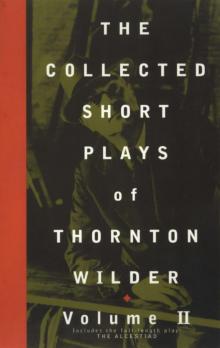 The Collected Short Plays of Thornton Wilder, Volume II
The Collected Short Plays of Thornton Wilder, Volume II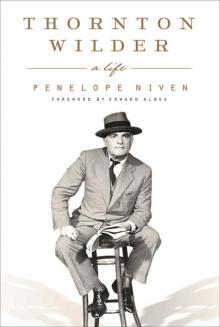 Penelope Niven
Penelope Niven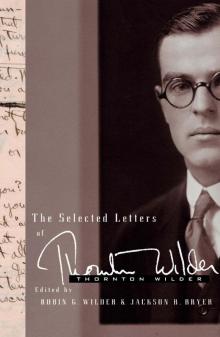 The Selected Letters of Thornton Wilder
The Selected Letters of Thornton Wilder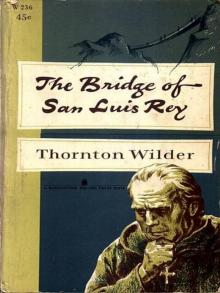 The Bridge of San Luis Rey
The Bridge of San Luis Rey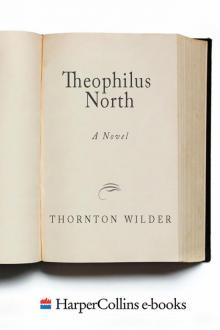 Theophilus North
Theophilus North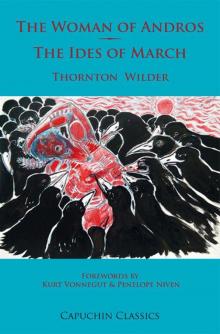 The Woman of Andros / the Ides of March
The Woman of Andros / the Ides of March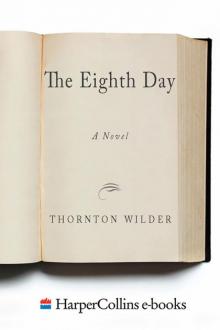 The Eighth Day
The Eighth Day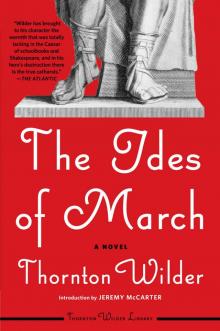 The Ides of March
The Ides of March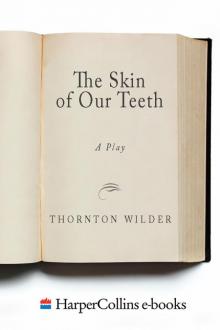 The Skin of Our Teeth
The Skin of Our Teeth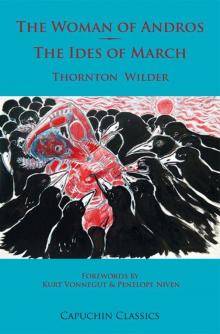 The Woman of Andros and The Ides of March
The Woman of Andros and The Ides of March